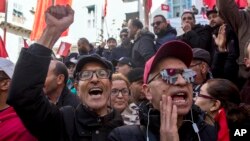The strike comes as Tunisia prepares to enter formal talks with the International Monetary Fund on a new bailout plan for its debt-laden economy.
Tunisians are facing soaring inflation, which hit 7.8 percent in May, and the Tunia General Labor Union (UGTT), has demanded a new deal to raise public sector salaries, including retroactively for last year.
While its opponents say the UGTT is ignoring the country's deep financial woes, the IMF has made a bailout deal conditional on the trade unions' support.
The government has presented a reform plan to the global lender which includes a freeze on the public sector wage bill, progressive cuts to some subsidies and a restructuring of publicly owned companies.
But the UGTT has warned against "painful reforms" aimed at pleasing the IMF.
"We're not demanding a pay rise, but a reset to workers' purchasing power to take inflation into account," as well as the scrapping of a one-percent social security tax introduced in 2018, Taboubi said.
The union has also demanded guarantees that state sector firms, including some monopolies and flag carrier Tunisair, remain publicly owned.
Tunisian economist Fadhel Kaboub said the strike was "the culmination of a collective failure by more than 10 Tunisian governments, the UGTT, the IMF and Tunisia's international partners" to restructure the economy.
"It will serve as a reminder to the IMF that working people in Tunisia can only sustain so much economic pain."
While the UGTT insists the strike is not political, it comes as President Kais Saied faces intense criticism for excluding opposition forces from his "national dialogue" -- part of a push to overhaul the Tunisian state and consolidate an ongoing power grab.
The UGTT, a co-laureate of the Nobel Peace Prize for its efforts in a previous national dialogue following Tunisia's 2011 revolution, had originally backed Saied when he sacked the government and suspended parliament.
But it has become increasingly critical as Saied has extended his power grab, which some of his rivals describe as a coup in the only democracy to emerge from the Arab uprisings of 2011.
Kaboub, who teaches at Denison University in the United States, said a decade of democratization had failed to deliver key economic reforms such as boosting food and energy sovereignty and investing in high value-added industries.
"It's time for the IMF, the Tunisian government and the UGTT to formulate an alternative vision for economic development in Tunisia," he said.








